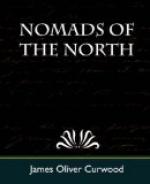They roved over the valley now. At Meshaba’s back, a mile on the other side of the ridge, was the old trapper’s cabin, where he lived alone. The winter had been long and cold, and in his gladness at the coming of spring Meshaba had come up the ridge to bask in the sun and look out over the changing world. For an hour his eyes had travelled up and down the valley like the eyes of an old and wary hawk. The dark spruce and cedar forest edged in the far side of the valley; between that and the ridge rolled the meadowy plain—still covered with melting snow in places, and in others bare and glowing, a dull green in the sunlight. From where he sat Meshaba could also see a rocky scarp of the ridge that projected out into the plain a hundred yards away. But this did not interest him, except that if it had not been in his line of vision he could have seen a mile farther down the valley.
In that hour of Sphinx-like watching, while the smoke curled slowly up from his black pipe, Meshaba had seen life. Half a mile from where he was sitting a band of caribou had come out of the timber and wandered into a less distant patch of low bush. They had not thrilled his old blood with the desire to kill, for there was already a fresh carcass hung up at the back of his cabin. Still farther away he had seen a hornless moose, so grotesque in its spring ugliness that the parchment-like skin of his face had cracked for half an instant in a smile, and out of him had come a low and appreciative grunt; for Meshaba, in spite of his age, still had a sense of humour left. Once he had seen a wolf, and twice a fox, and now his eyes were on an eagle high over his head. Meshaba would not have shot that eagle, for year after year it had come down through time with him, and it was always there soaring in the sun when spring came. So Meshaba grunted as he watched it, and was glad that Upisk had not died during the winter.
“Kata y ati sisew,” he whispered to himself, a glow of superstition in his fiery eyes. “We have lived long together, and it is fated that we die together, Oh Upisk. The spring has come for us many times, and soon the black winter will swallow us up for ever.”
His eyes shifted slowly, and then they rested on the scarp of the ridge that shut out his vision. His heart gave a sudden thump in his body. His pipe fell from his mouth to his hand; and he stared without moving, stared like a thing of rock.
On a flat sunlit shelf not more than eighty or ninety yards away stood a young black bear. In the warm glow of the sunlight the bear’s spring coat shone like polished jet. But it was not the sudden appearance of the bear that amazed Meshaba. It was the fact that another animal was standing shoulder to shoulder with Wakayoo, and that it was not a brother bear, but a huge wolf. Slowly one of his thin hands rose to his eyes and he wiped away what he thought must surely be a strange something that was fooling




